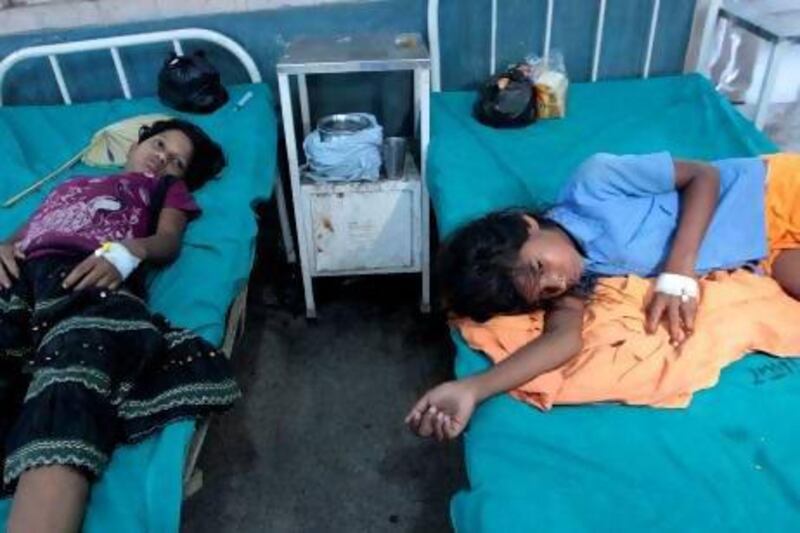NEW DELHI // At least 25 children have died and dozens more have fallen ill after eating a free school lunch suspected to be contaminated with insecticide.
The tragedy in the village of Masrakh in Bihar sparked riots among angry residents while the state's government announced an inquiry into the deaths.
Preliminary investigations at the state-run school show traces of a insecticide commonly used on rice and wheat crops, according to PK Shahi, Bihar's education minister.
"The meal was contaminated. It contained phosphorous. We will hold the supplier responsible." Mr Shahi told a news conference yesterday in Patna, the state capital.
Poonam Kumari, government administrator in Mashrakh, said 25 children were dead.
The state government fears the death toll could rise further as some of the children affected, all below the age of 12, are in critical condition.
Separately, one child was reported to have died and more than 30 taken ill after eating free school lunches in Gaya and Madhubani, also in Bihar.
The incidents are alarming to authorities because the government's school midday meal programme feeds 120 million children at 1.2 million schools across the country.
The children in Masrakh ate a lunch of rice, lentils and soya bean on Tuesday afternoon, said Mr Shahi.
"Investigators are examining midday meal samples and samples of victims' vomit. Only the final report of inquiry will reveal the real cause," Amarjeet Sinha, the principal secretary of the education department, told reporters in Patna.
Amit Khurana, head of the food safety unit at the Centre for Science and Environment in New Delhi, said the rice grains may not have been washed properly before being cooked.
Mr Khurana said even that washing might not have removed the toxins.
Organophosphate insecticides, outlawed in many countries, were banned in India in 2005 for use on vegetables but continue to be used on rice crops, he said.
Consumption of the insecticide can lead to complications of the respiratory, cardiovascular and nervous systems.
Sixteen children were taken by autos, buses and lorries to hospital in the nearby town of Chhapra died on Tuesday afternoon. Four of six children brought to the Patna Medical College died late on Tuesday night and the other two yesterday. Among the dead are two children of the woman who cooked the school meal.
Forty-seven pupils and the school cook were in hospital in nearby towns and cities and being treated with atropine, Mr Sinha said.
The chief minister of Bihar, Nitish Kumar ordered an inquiry and announced compensation of 200,000 rupees (Dh12,380) for the families whose children have died.
The children who died, all under the age of 10, were buried near the school yesterday as angry residents took to the streets, armed with poles and sticks and clashed with the police.
Tensions remained high in the state as another child died yesterday and 22 fell sick after their midday meal at a school in Gaya district. State officials said an investigation had been launched, the Dainik Jagran Hindi daily reported.
In a third case, fifteen more children fell ill yesterday after eating their free midday meal at a state-run school in the Madhubani district.
According to local reports, a dead lizard was found in the rice cooked for the students. The children complained of stomach ache soon after the meal and 10 were said to be in critical condition. Some of the more critical cases were transferred to a district hospital, according to the Zee News TV station.
India's midday meal scheme provides free food to encourage parents to keep their children in school and ensure they receive proper nutrition. The central government funds the programme but it is up to the state governments to implement it.
In some states, such as Tamil Nadu and Chattisgarh, the programme is run by local village women's groups and has been a huge success, whereas in states such Uttar Pradesh and Bihar where the supply of food is contracted out to businesses, there is poor hygiene and corruption, and funds are often siphoned off by contractors tasked with providing the grains and pulses.
In March, two children died in the northern state of Haryana, after eating a midday meal, according to the National Human Rights Commission.
Last year, more than 130 children were hospitalised in the western state of Maharashtra after eating lunch at a state-run school. An investigation found that the food served was contaminated with E coli bacteria.
Overall, however, the quality of the food and the number of children it reaches across the country has gone up significantly, Mr Khurana said.
The mid day meal was first introduced for poor children in the southern city of Chennai in 1925.
Food prices have soared in India over the past six years, causing increased hardship for the 455 million people estimated by the World Bank to live below the poverty line.
Ahead of elections next year, the government this month announced a subsidised food programme to offer grains to nearly 70 per cent of the population, or 820 million people, at a small fraction of market prices.
sbhattacharya@thenational.ae
Additional reporting by Agence France-Presse
twitter: For breaking news from the Gulf, the Middle East and around the globe follow The National World. Follow us
Dozens of children die after eating school lunch
At least 25 Indian children die and dozens more fall ill after eating a state-supplied school lunch suspected to be contaminated with insecticide.

Editor's picks
More from the national




